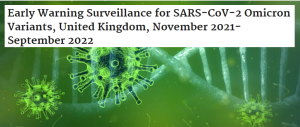The SIREN (SARS-CoV-2 immunity and reinfection evaluation) study acts as a surveillance system for COVID-19 and its variants.
By Desy Nuryunarsih on behalf of the SIREN Scotland Research Team*
It has been 1015 days since the first SIREN participants were recruited for the SIREN UK study. Insight from the SIREN study has proved vital for informing Government policy and made significant contributions to the understanding of immunity to SARS-CoV-2 [1-4].
Surveillance of COVID-19 infection has been very important to enable rapid detection, isolation, testing, and management of suspected cases, to establish guidelines for implementation of control measures, to evaluate the impact of COVID-19 on the healthcare system and society, to monitor the evolution of the SARS-CoV-2 virus and to understand the circulation of the virus and its variants while identifying and following up contacts to the virus [5].
A recent SIREN publication from across the UK has shown that since the SIREN study began, amongst more than 44,000 UK healthcare workers, SIREN has detected 323 infections with Alpha Variant, 1,042 infections with Delta variant, and 83 infections with the Delta plus subvariants [6].
Belgium reported the first case of the omicron variant in Europe on 26 November 2021. By the morning of November 29th, the UK had recorded nine cases of the variant, with six of them originating from Scotland. This variant represents the highest level of mutation observed so far, containing mutations that are comparable to those found in previous variants of concern that have been linked to increased transmissibility and reduced effectiveness of vaccine-generated immunity [7]. SIREN identified higher cases of Omicron infections with 1,487, 1,514, 51, 236, and 4 cases of Omicron variant BA.1, BA.2, BA.4, BA.5, and XE respectively [6].
The SIREN cohort are highly vaccinated and have had high rates of prior infections and despite this they presented with high numbers of infections with Omicron BA.1 and BA.2. Thus, SIREN data suggests that infection-acquired and vaccine-acquired immunity was less protective against Omicron BA.1 sub-variant infection [6]. This is consistent with the SARS-CoV-2 variant of concern report of the European Centre for Disease Prevention control and the UK national surveillance trends [8].
Although SIREN does not represent the general UK population, the cohort represents a highly exposed group who have regular contact with vulnerable patients, This, in addition to the relative timeliness of its surveillance, shows the SIREN study plays an important role in complementing other national surveillance programmes. As the UK adapts to a new phase of the pandemic response with reduced testing, SIREN provides a sustainable and focused surveillance platform. The SIREN study will continue to provide data to inform the ongoing government response to COVID-19 [6].
Pictures retrieved from pixabay
*The Scottish SIREN Team past and present: Nicole Sergenson, Jennifer Bishop, Melanie Dembinsky, Laura Dobbie, Josie Evans, Lynne Haahr, Desy Nuryunarsih, Caitlin Plank, Lesley Price, Laura Naismith, Jenifer Weir, Ayodeji Matuluko, Desmond Areghan, Annelysse Jorgenson, Sally Stewart, Andrew Telfer, and Alexander Olaoye
References
- GOV Welsh, Technical advisory group modelled levels of protection against COVID-19 Infection and severe disease in Welsh 28 June 2022, H.a.S. care, Editor. 2022, GOV UK: United Kingdom.
- Wallace, S., et al., SIREN protocol: Impact of detectable anti-SARS-CoV-2 on the subsequent incidence of COVID-19 in 100,000 healthcare workers: do antibody positive healthcare workers have less reinfection than antibody negative healthcare workers? medRxiv, 2020: p. 2020.12.15.20247981.
- The Government UK, Joint Committee on Vaccination and Immunisation (JCVI) updated statement on the COVID-19 vaccination programme for autumn 2022, H.a.S. science, Editor. 2022, GOV.UK: United Kingdom
- Welsh Government, Technical Advisory Cell: advice from TAG for the 17 September restriction review. 2021, Technical Advisory Cell: United Kingdom.
- World Health Organization. Public health surveillance for COVID-19. 2020.
- Foulkes, S., et al., Early Warning Surveillance for SARS-CoV-2 Omicron Variants, United Kingdom, November 2021-September 2022. Emerg Infect Dis, 2023. 29(1): p. 184-188.
- Torjesen, I., Covid-19: Omicron may be more transmissible than other variants and partly resistant to existing vaccines, scientists fear. BMJ, 2021. 375: p. n2943.
- ECDC European Centre for Disease Prevention and Control. SARS-CoV-2 variants of concern as of 26 January 2023. 2023 [cited 2023.
To find out more about the SHIP team, head on to the GCU website, read the rest of our blogs and follow us on Twitter @SHIPGCU
